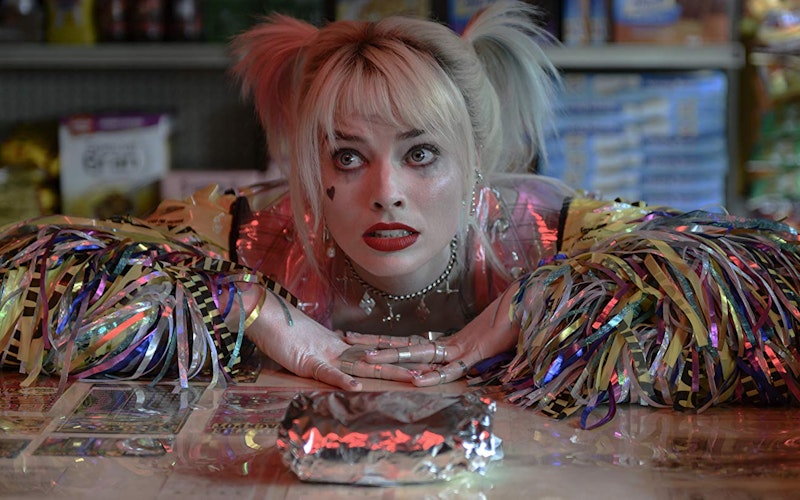
Movies
Harley Quinn and Degrees of Sin
Harley Quinn doesn’t believe in the banality of evil.
In Harley Quinn: Birds of Prey, the former paramour of the Joker celebrates singlehood by doubling down on her bubblegum, bad-girl bombast. With pigtails seemingly dipped in blue-and-pink paint and sparkly makeup highlighting her pallid face, Harley (Margot Robbie) hijacks a tanker truck and drives it into the chemical plant where she and the Joker once pledged allegiance to each other. Rolling out of the truck just before it collides, she cackles while watching the plant explode, illuminating the night sky. When Harley commits a crime, she also throws a party.
Directed by Cathy Yan, Harley Quinn: Birds of Prey is a bit of a mess—there are way too many characters and enough subplots to support three movies—but when the focus is on Robbie as the gleeful anarchist of the title, the film is a perfect match of aesthetics and character. (All you need to know about Harley Quinn is that she participates in the climactic vehicle chase on turquoise-and-pink roller skates.) Harley is no good—at one point she marches through a police station shooting officers with paintballs and confetti—but she’s having so much fun. And anyway, surely she’s not as bad as Roman Sionis (Ewan McGregor), a gangster with a grudge against Harley and a habit of slicing the faces off of his adversaries. He’s definitely a worse dresser.
In cheering on one vivacious villain while placing her in opposition to another, who’s far more objectionable, Harley Quinn: Birds of Prey puts us in a morally compromised position. And in doing so, it makes us ask: are some sins worse than others?
When Harley commits a crime, she also throws a party.
Catholic tradition distinguishes between mortal sins (those which negate our salvation) and venial sins—those acts that are still sins, but less serious in their consequences and still covered by God’s saving grace. The Protestant Reformation did away with this distinction, emphasizing that all sin is mortal while also atoned for by Christ’s work on the cross. Yet Protestants still believe that there are lesser and greater sins. It’s fair to say that Harley’s partying to the point of vomiting in a purse is a lesser sin than Roman’s mutilating the daughter of a rival gangster.
According to the New Testament, such distinctions do have consequences. “It’s clear that we have different degrees of sin when we consider the warnings of Scripture,” wrote the late R.C. Sproul. “There are at least 22 references in the New Testament to degrees of rewards that are given to the saints in heaven. There are different levels, different rewards, and different roles in heaven. The Bible warns us against adding to the severity of our judgment.” One example Sproul cited is John 19:11, where Jesus tells a probing Pontius Pilate that “the one who handed me over to you is guilty of a greater sin.”
So does that make Harley a variation on Pontius Pilate, and Roman Sionis the equivalent of those who demanded Jesus’ conviction? Is all of this my elaborate attempt to exonerate Harley Quinn?
Maybe we should back up and focus less on sinful acts and instead consider the state of sin we all find ourselves in. Sinful acts are the fruit of our willful separation from God; they both reflect our apartness and increase it. And so the question isn’t so much how Harley Quinn behaves, but what her behavior reveals about her relationship to her Creator—the One who gifted her with a quick sense of humor, a keen eye for fashion, and the agility to ride behind a motorcycle on roller skates. Harley doesn’t have to drain herself of color—as far as I know, hot pink is as holy as the purple of Lent—but she may want to reconsider if those gifts are being used for her own dead-end glory, or to glorify the One who gave them to her.
Harley moves closer to something like that in the movie’s finale, when she has a choice regarding just how bad she’s willing to be (interestingly, the choice involves potential mutilation). I won’t give away the details, but it probably shouldn’t come as a surprise that she isn’t willing to go as far as someone like Roman Sionis. Even so, at the end of the film, Harley still has another choice to make, one that doesn’t involve taking or stealing but receiving. Can Harley Quinn, prankster criminal, admit that a life of self-glorification will ultimately leave her empty and accept the humbling gifts of mercy and grace?
When first released, Harley Quinn: Birds of Prey had a different title—Birds of Prey: And the Fantabulous Emancipation of One Harley Quinn. I like that “emancipation” is in there. It’s meant to refer to her split from the Joker, but it could also allude to an escape from being a slave to sin. Freedom awaits those who accept such a gift—a freedom more colorful than even Harley Quinn herself can imagine.
Topics: Movies